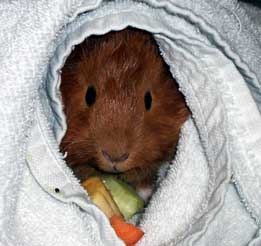
Guinea pigs (or cavies) are cute little creatures but they are not easy to feed correctly.
The main reason is that guinea pigs are the only species, apart from humans, that requires vitamin C included in their diet. Most other animals have a specific enzyme that enables them to make Vitamin C.
What should I be feeding my guinea pigs?
Like rabbits, guinea pigs are herbivores and require a high fibre diet. They should have grass or grass hay (e.g. meadow, timothy, fescue, oaten, pasture, paddock or ryegrass hays) available at all times. Lucerne or clover hay can be offered but not as the sole source of fibre as they are high in calcium and protein. Suitable grasses include clover, buffalo grass and oat grass. Guinea pigs also enjoy dandelion, milk thistle and a variety of fresh herbs.
Grass and hay encourages chewing for long periods of time and helps to keep their teeth in good condition, which grow continuously throughout the guinea pig’s life. The hay is best provided to them, if possible, in a hayrack attached to their cage wall.
Fresh leafy green vegetables and herbs should also be offered. Vegetables include broccoli, cabbage, celery, endive, beet/carrot tops, brussel sprouts, zucchini, capsicum, spinach leaves, bok choy and other Asian greens, dark-leafed lettuce varieties, fresh (uncooked) peas and string beans. Herbs include parsley, coriander, mint, dill, basil, dandelion, rocket.
Offer a variety of 2 or 3 different greens each day and remember to make any changes to the diet slowly to avoid gastric upset.
Avoiding Vitamin C deficiency
Guinea pigs also require a dietary source of vitamin C, otherwise they will suffer from ‘scurvy’. This is usually supplied by fresh greens but small amounts of vitamin C-rich fruit can also be offered e.g. citrus, kiwi fruit, strawberries.
High quality guinea pig pellets (minimum 16% fibre) can be offered in small amounts as a treat. Many commercial pellets are too high in fats and carbohydrates and low in fibre, and should not be fed ad lib or as the sole diet. Their vitamin C content also declines once the bag is opened.
Pregnant cavies have a higher requirement for vitamin C and oral supplementation may be required – contact your vet for advice.
If your guinea pig is not fed on an adequate diet, signs of vitamin C deficiency will occur about two weeks after the deficiency starts.
Your guinea pig will be lethargic and weak. It will eat less and lose weight and may have enlarged limb joints. It may also develop a rough hair coat, have diarrhoea and produce discharge from its eyes and nose. Death usually occurs in about three to four weeks.
What foods shouldn’t I feed?
Foods to avoid include cereals, grains, nuts, seeds, washed or brushed potatoes, wild mushrooms and berries, onion, shallots, avocado, rhubarb, breads, biscuits, sweets, sugar, breakfast cereal and chocolate.
Don’t feed your guinea pig rabbit or rodent pellets.
Hygiene
Guinea pigs are slobs when it comes to table manners and etiquette. They scatter their bedding into their food, their food into their water, their water into their bedding and if that’s not enough they often soil in their food, water and bedding too!
For this reason, their food and water containers must be cleaned out and re-stocked daily.
To prevent the pigs from nesting in their food and water containers, it is best if the containers are suspended above the ground. If this is not possible, provide them with heavy food and water containers that cannot be overturned.
You will find water bottles for guinea pigs available at pet shops. These are hygienic but guinea pigs will often block the end of the water tube with slurry of food and water from their mouths as they drink. For this reason, their water containers must be checked daily.
By Provet Resident Vet
Contributor: Dr Julia Adams BVSc
Last updated on 17 December 2019